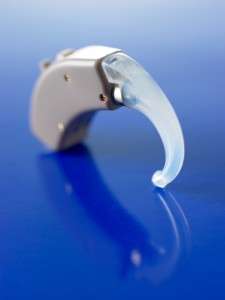
Do your hearing aids ever whistle? It could be due to one of these reasons.
“Give a little whistle!”
If you’ve ever watched Disney’s Pinnochio, you are likely familiar with the song that Jiminy Cricket sings, titled, “Give a Little Whistle.” In the movie, this whistle is a cry for help. If you wear hearing aids, chances are you have heard them whistle at some point or another. This sound is called feedback, and while it can be normal, it can also be your hearing aids’ “call for help.”
Feedback is simply the result of a sound being picked up by the microphone and amplified, causing the noise to “loop,” or repeat. This is the same effect that is heard when a microphone on stage gets too close to a loudspeaker. However, since the hearing aids’ speaker is quite small, the effect is not nearly as loud.
Feedback is normal for many patients with hearing aids. In fact, many patients check whether their hearing aids are working correctly by holding a hand near their ear. This position causes the sounds from the microphone to reflect off the hand and begin that feedback loop. If feedback only happens when a hand is placed near the ear, there is generally nothing to be concerned about.
However, sometimes feedback can occur for other reasons. Your ears may have accumulated too much wax, the hearing aid may no longer fit properly, or the hearing aid may be malfunctioning.
Earwax
A large amount of earwax (cerumen) can cause sound to reflect back into the hearing aid’s microphone. When you notice new or unexplained feedback from your hearing aids, you can often fix the problem by removing excess earwax.
Poor Fit
Patients also experience feedback when a hearing aid is poorly fit. Sometimes, simply pressing the hearing aid further into the ear will reduce or eliminate the issue. Other patients experience poor retention, meaning that their hearing aids wiggle or even fall out while eating or speaking. This loose fit will cause sound to leak out, resulting in feedback. Another possible reason for hearing aid feedback is a change in one’s ear canal shape. Aging, weight loss, and weight gain can all affect a hearing aid’s fit.
Strong Amplification
If you have severe hearing loss and require strong amplification, you are more likely to experience feedback. Although hearing aid technology reduces the chance of feedback, it cannot always eliminate it completely. In cases of severe hearing loss, a little feedback may always exist, especially when objects come near the ear (scratching, hugging, sitting near walls).
Broken Hearing Aids
The last reason a hearing aid will produce feedback is that it is broken. Broken hearing aids can cause issues with the microphone, speaker, or even the internal circuitry. In these cases, an audiologist will not be able to resolve the issue in the office, and the hearing aids must be sent to the manufacturer for repair.
At Clarity Audiology, we are equipped to deal with every possible scenario when it comes to feedback issues.
- Earwax? We can safely remove it for you!
- Poor fit? We can easily recommend a different fit.
- Strong amplification? We are trained to educate you on best options to eliminate feedback.
- Broken hearing aids? We can repair them for you!
Of course, this list is not exhaustive. Many other reasons can cause hearing aid feedback. If your hearing aids have begun to “give a little whistle,” be sure to answer their “call for help” by visiting us. We will evaluate the cause and work toward reducing or eliminating the problem.
Trust the Experts at Clarity Audiology & Hearing Solutions
Need help with your hearing? Clarity Hearing can help. Clarity Audiology & Hearing Solutions is an independently owned and operated clinic that focuses on quality of care and personalized, friendly service to the surrounding areas of Ellicott City, Catonsville, Columbia. Our Doctors of Audiology are highly trained with advanced degrees and take the time to provide the personalized care and attention that you need and deserve. We provide advanced hearing aid options that are personally calibrated with cutting-edge digital technology to fit your hearing loss, your unique ear anatomy, and your individual listening needs.
You can call us today to schedule a FREE Hearing Protection Consultation at 410-698-6594! For more blog posts, news, and updates, follow us on Facebook, Twitter, Pinterest, and LinkedIn.
